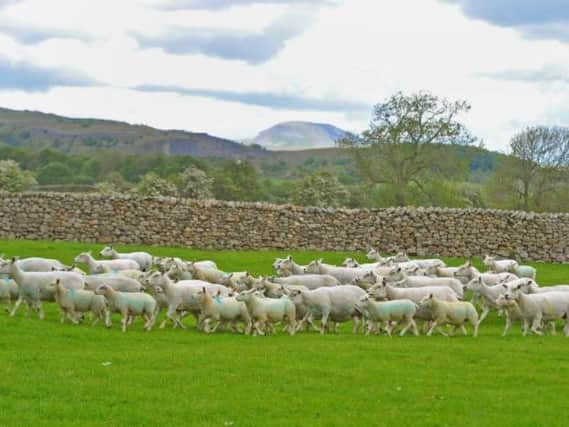Farms could be pushed 'onto a cliff edge' financially if post-Brexit funding model is not delayed


With Britain no longer tied to the Common Agricultural Policy (CAP) following its departure from the European Union, Ministers plan to usher in a new payment scheme.
Described as the biggest overhaul in the industry for half a century, it will see a move away from subsidies and will instead reward farmers for using their land to benefit the environment.
Advertisement
Hide AdAdvertisement
Hide AdHowever, while the existing payments start winding down from this year, many within the industry fear a lack of detail about the new scheme is making it impossible for farmers, many of whom are already straddling a financial knife edge, to plan for the future.
The chief executive of the National Beef Association, Neil Shand, said: “In the UK, many livestock farms rely on subsidies for more than 70 per cent of their profits.
“That money will reduce by five per cent this year, 20 per cent in 2022 and at the moment there is no clear blueprint as to how that funding gap will be plugged.
“Most people in farming support the premise behind the new model and are willing to embrace change.
Advertisement
Hide AdAdvertisement
Hide Ad“However, the transition is incredibly complex and the events of the last year have only added to the difficulties in finalising how it will work in practice.
“Farmers are effectively being told they have a new job, but not what it is or how much they will be paid for it.
“The only sensible thing to do is to press the pause button, allowing the payments to continue in full for another one or two years until we are confident that the transition can be done smoothly and with the full support of the farming community.”
Mr Shand’s concerns have been echoed both by the Institute for Public Policy Research (IPPR) think tank, which has called for the Government to publish a detailed roadmap identifying landmark dates between now and the full roll-out of the new Environmental Land Management schemes (ELMs) in 2024, and opposition MPs.
Advertisement
Hide AdAdvertisement
Hide AdShadow Farming Minister Daniel Zeichner, the Labour MP for Cambridge, said: “The Basic Payment Scheme was by no means perfect, but it did get money into people’s hands.
“This year, the Government's reduction in those payments equates to £12.6m in Yorkshire and the problem we face now is that no one seems to be able to say how that money will be replaced.
“Farmers are seeing cuts now, but the new Environmental Land Management schemes are still being designed, tested and piloted, with no plans for replacement payments being available until 2022/23 at the earliest.
“Labour supports the principle of reforming farm payments to help improve our natural environment, but we're worried the Government’s reckless approach is leading to a cliff edge for farmers.”
Advertisement
Hide AdAdvertisement
Hide AdThe Department for Environment, Food and Rural Affairs has insisted the changes are vital in helping the Government achieve its environmental goals and has assured help will be available to support farmers facing a funding gap.
A spokesman said: “As we phase out direct payments over the seven-year agricultural transition period, we will offer financial assistance to help farmers prepare, and invest in ways to improve their productivity and manage the environment sustainably - whilst ensuring farmers and horticulturists are kept informed every step of the way.”
However, the Conservative MP for Scarborough and Whitby, Robert Goodwill, who was instrumental in formulating the new strategy during his spell as Agricultural Minister, also believes a pause should not be ruled out.
Mr Goodwill, who runs a 250-acre farm near Malton, said: “There is a provision within the original Bill to delay the roll out and it is there for good reason. We need to ensure that the new model both rewards good environmental work and gives farmers the flexibility to preserve and protect the countryside.
“This is too important to get wrong and if more time is needed, then we shouldn’t be afraid to delay its introduction.”